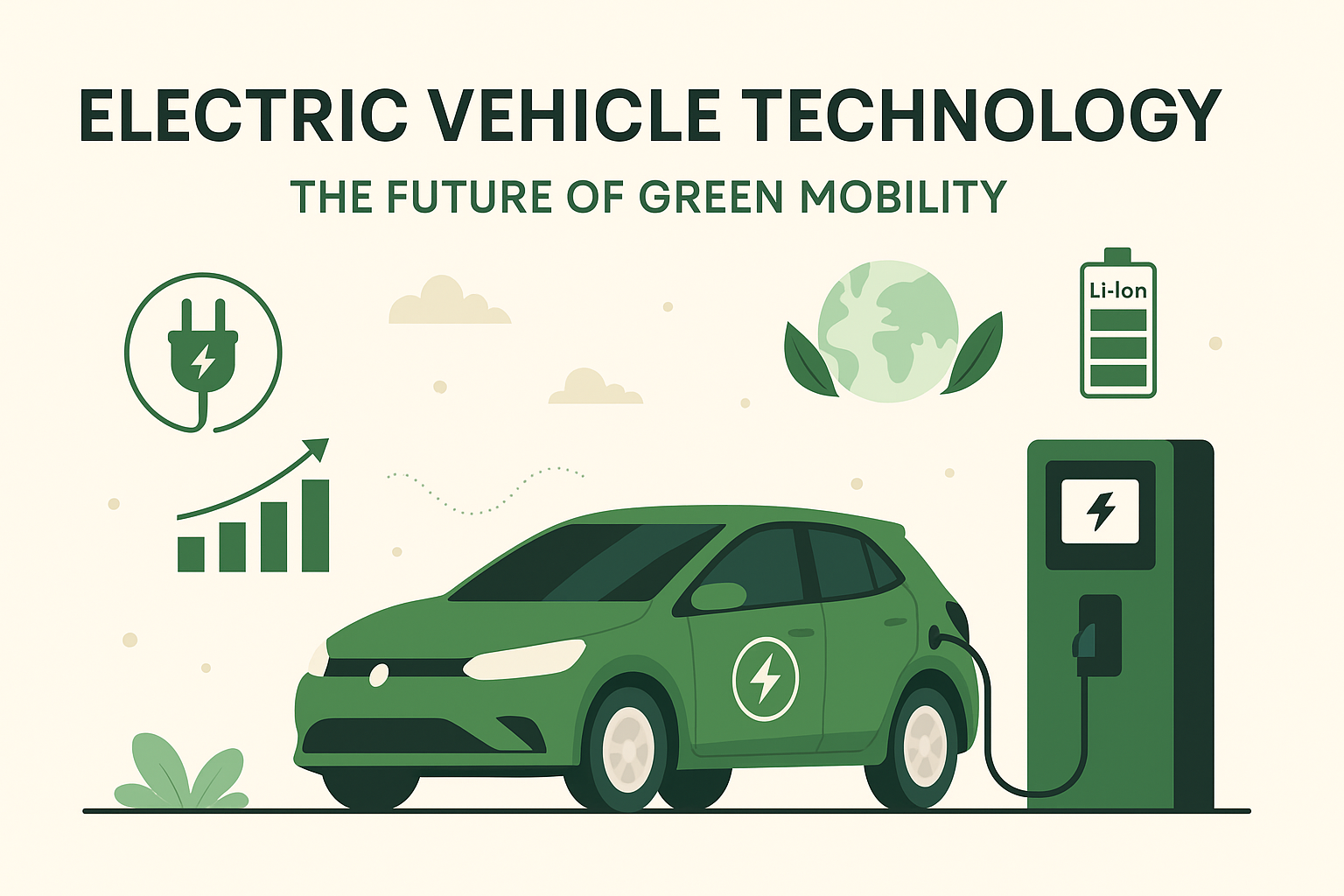Electric Vehicles (EVs) are not just the future of transportation—they are the present. With rising fuel prices, climate change concerns, and rapid urbanization, EVs are emerging as a clean, smart, and sustainable alternative to traditional vehicles. Whether it’s a car, scooter, bus, or even a truck, electric vehicle technology is revolutionizing the way we move.
In this article, we will dive deep into EV technology, its working, types, advantages, real-world adoption, and the future it promises. We’ll keep the language easy and facts straight to make it useful and interesting for everyone.
🔌 What is an Electric Vehicle (EV)?
An Electric Vehicle (EV) runs on electric power stored in a battery instead of using petrol or diesel. It uses an electric motor for propulsion, which is more efficient and cleaner than an internal combustion engine (ICE).
There are mainly three types of EVs:
- Battery Electric Vehicles (BEVs) – Fully electric with no engine (e.g., Tata Nexon EV, Tesla Model 3)
- Plug-in Hybrid Electric Vehicles (PHEVs) – Runs on both fuel and electric power (e.g., Toyota Prius Prime)
- Hybrid Electric Vehicles (HEVs) – Combines ICE and electric motor (e.g., Honda City e:HEV)
⚙️ How Does an Electric Vehicle Work?
Here’s a simple explanation of how an EV works:
- Battery Pack – Stores electric energy (usually Lithium-ion batteries)
- Inverter – Converts DC (battery power) to AC (for the motor)
- Electric Motor – Drives the wheels using AC electricity
- Controller – Acts as the brain; manages power and speed
- Charging Port – Used to charge the battery
🧠 EVs have fewer moving parts than traditional cars, which makes them quieter, more reliable, and easier to maintain.
🌱 Why Electric Vehicles Are Better: Key Advantages
✅ 1. Environment Friendly
EVs produce zero tailpipe emissions. They help reduce air pollution and fight climate change by lowering carbon dioxide (CO₂) levels.
✅ 2. Low Running Cost
Electricity is cheaper than petrol/diesel. Charging an EV costs much less than refueling a regular car.
✅ 3. Less Maintenance
EVs have fewer parts like no engine oil, fewer filters, no clutch—leading to low maintenance cost.
✅ 4. Energy Efficient
EVs convert about 85-90% of electrical energy into motion, compared to 25-30% in petrol/diesel vehicles.
✅ 5. Government Support
Subsidies like FAME-II scheme in India, tax rebates, and incentives make EVs more affordable.
📊 EV Growth in India and Global Market
India is steadily moving toward electric mobility. According to NITI Aayog, India aims to achieve 30% EV sales by 2030. Here are some key stats:
- Tata Motors leads in EV cars with Nexon EV and Tiago EV.
- Ola Electric and Ather Energy are dominating the 2-wheeler EV market.
- State EV Policies like those in Delhi, Maharashtra, and Karnataka offer strong support.
🌍 Global Perspective:
- Norway: Over 80% of new cars sold are electric.
- China: World’s largest EV market (over 50% global share).
- USA: Tesla leads with advanced EV tech and infrastructure.
🔋 The Heart of an EV: Battery Technology
🔹 Lithium-ion Batteries:
Most EVs use Li-ion batteries due to their high energy density, fast charging, and durability. They last for around 8–10 years or 1.5 lakh kilometers.
🔹 Battery Capacity:
Measured in kWh (kilowatt-hour). Higher the kWh, longer the range. For example:
- Tata Tiago EV – 24 kWh battery, ~250 km range
- Tesla Model S – 100 kWh battery, ~600+ km range
🔹 Charging Methods:
- Slow Charging (AC) – Home-based; 6–8 hours
- Fast Charging (DC) – Public stations; 30–90 mins
🔋 Future batteries may include solid-state batteries, which offer faster charging, more safety, and longer life.
⚡ Charging Infrastructure: The Backbone of EVs
A major challenge in EV adoption is charging availability. India is working hard to expand its EV charging network:
- Types of chargers: Type 2 AC, CCS2 DC, CHAdeMO
- Charging Stations: Being installed at highways, malls, offices, homes
- Mobile apps like Tata Power EZ Charge, Statiq, and ChargeGrid help locate nearby stations.
🚧 The government plans to set up 22,000+ charging stations across India by 2030.
🧠 Smart Features in Modern EVs
Modern electric vehicles are equipped with advanced technology:
- Regenerative Braking: Converts braking energy into battery charge
- Connected Apps: Monitor battery, range, location, etc.
- Autonomous Driving: Tesla and BYD working on self-driving features
- Voice Assistants, AI, OTA Updates: Making EVs more futuristic
🚀 Future of Electric Vehicles
The future of EVs looks very bright:
- Flying EVs and Drones: Trials already happening
- Battery Swapping Stations: Quick and easy battery replacement
- Hydrogen Fuel Cell EVs: Zero emission, long range
- EV Fleets: Delivery services and cabs shifting to electric
🧑🏫 Career Opportunities in EV Sector:
- EV Design Engineer
- Battery Management System Expert
- EV Charging Infra Manager
- Data Analyst (EV Performance)
🧾 EV Policy Highlights in India
Here are some important EV-related policies in India:
- FAME II Scheme: ₹10,000 crore budget to promote EVs
- GST Cut: EVs taxed at just 5% (vs. 28% for normal vehicles)
- State Subsidies: Additional incentives in states like Delhi, Gujarat, TN
🤔 Common EV Myths Busted
| Myth | Truth |
|---|---|
| EVs are slow | EVs have instant torque and fast acceleration |
| No charging stations | Infra is growing rapidly |
| EVs are expensive | Total cost of ownership is low |
| EVs don’t last long | EVs have long lifespan and warranties |
📈 Final Thoughts: Is EV the Right Choice for You?
If you care about the environment, want to save on fuel costs, and love new technology, then switching to an EV is a smart move. With improving range, better charging infra, and strong government support, EVs are becoming the new normal.
The EV revolution is here—and it’s silent, smart, and sustainable.
🟢 Bonus: Top Electric Cars in India (2025)
| Model | Range | Price |
|---|---|---|
| Tata Nexon EV | 325-465 km | ₹14.5–19.5 lakh |
| MG ZS EV | 461 km | ₹23.5 lakh |
| Hyundai Ioniq 5 | 631 km | ₹46 lakh |
| Mahindra XUV400 EV | 456 km | ₹15.99 lakh |

